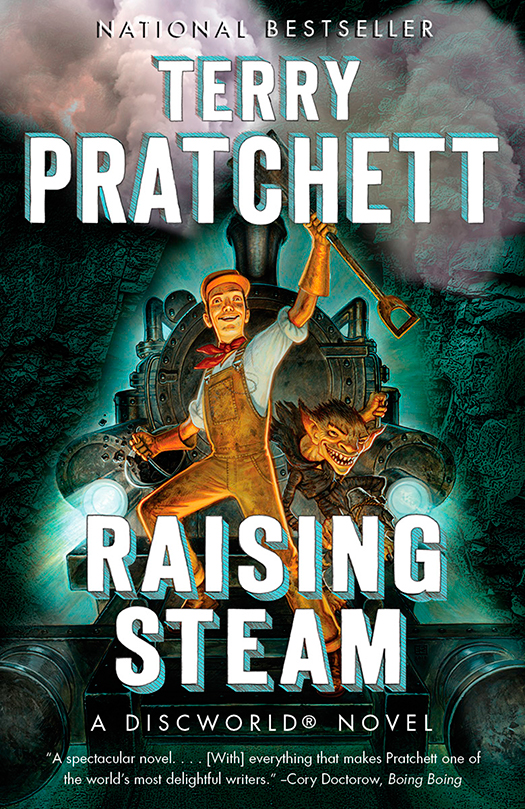
Raising Steam
Discworld Series, Book 40
کتاب های مرتبط
- اطلاعات
- نقد و بررسی
- دیدگاه کاربران
نقد و بررسی

Starred review from February 24, 2014
A brash new invention brings social upheaval, deadly intrigues, and plenty of wry humor to the 40th installment of Pratchett's best-selling Discworld fantasy series. When intrepid inventor Dick Simnel comes to Ankh-Morpork looking for a backer for his revolutionary steam engine, the Iron Girder, entrepreneur Sir Harry King is quick to grasp the possibilities. So is Ankh-Morpork's ruler, Lord Vetinari, who immediately puts master facilitator (and former con artist) Moist von Lipwig in charge of the Discworld's first railway. But while the would-be railway tycoons are busy cutting deals for right-of-ways, supplies, and second class coach service, a group of radically conservative dwarf extremists are determined to stop the railroad, along with anything else that threatens "the truth of pure dwarfishness." In a realm where "even the factions had factions," Moist finds himself cast as Vetinari's agent to help defeat a political coup that could re-ignite ancient hostilities between dwarves and trolls. As always, Pratchett's unforgettable characters and lively story mirror the best, the worst, and the oddest bits of our own world, entertaining readers while skewering social and political foibles in a melting pot of humanity, dwarfs, trolls, goblins, vampires, and a werewolf or two.

March 1, 2014
Pratchett's 40th Discworld novel brings in one--or, as it turns out, two--intriguing new characters and introduces a radical new concept: the railway. Young genius engineer Dick Simnel invents a steam locomotive he names Iron Girder. Waste management tycoon Sir Harry King immediately grasps the lucrative possibilities and invests part of his fortune in the railway. Ankh-Morpork's Lord Vetinari intends for the city to keep control of the new enterprise and appoints con man-turned-civil servant Moist von Lipwig to keep an eye on matters. The railway proves wildly popular with the public. Unfortunately, dwarf fundamentalists opposed to fraternization with trolls or humans begin making terrorist attacks, murdering railway workers and setting fire to clacks communications towers. The terrorists eventually overthrow the legitimate dwarf government in Uberwald while the dwarf Low King is more than 1,000 miles away. Only by means of the railway, declares Lord Vetinari, can Low King Rhys return to Uberwald in time to foil the plotters. But Uberwald, haunted by vampires and werewolves, may be approached only across high plains covered with stumbleweed ("like tumbleweed, but less athletic"). And, Moist protests, the railway isn't finished. Somehow, Vetinari explains kindly, Moist better find a way to finish it if he wants his head to remain attached to his neck. Young Dick, meanwhile, entertains a most peculiar notion: that Iron Girder is female and sentient. And after witnessing the locomotive deal with a misguided dwarf's attempted sabotage, Moist is inclined to agree with him. In recent years, Discworld humor has become implicit (check out the hilarious names of Uberworld towns, for example) rather than explicit, while continuing to explore serious themes with impeccable Discworld logic, and the trend continues here. Brimming with Pratchett's trademark wit, a yarn with a serious point made with style and elegance.
COPYRIGHT(2014) Kirkus Reviews, ALL RIGHTS RESERVED.

March 15, 2014
The industrial revolution has come to Discworld in the form of a new steam locomotive. Invented by young, self-taught engineer Dick Simnel, this new technology is quickly seized upon by Ankh-Morpork's Lord Vetinari, who sets Moist von Lipwig the task of managing the new project. Meanwhile, political upheaval among the dwarfs threatens the railway, as terrorists attempt to sabotage the line while the dwarf king is aboard. VERDICT Full of Pratchett's usual sly humor and clever wordplay, this is another solid entry in the hugely popular "Discworld" series. Spearing of politics, religion, and society as a whole is what one usually expects in a Pratchett book, and if this doesn't reach the heights of some of the best books of the series (such as Guards!, Guards! or Going Postal), it will still be much in demand in public libraries. [200,000-copy first printing.]
Copyright 2014 Library Journal, LLC Used with permission.

March 1, 2014
In 2007, just years before he was granted a knighthood for services to literature, Terry Pratchett announced he had been diagnosed with a rare form of early-onset Alzheimer's disease. Although his illness has limited his ability to use a keyboard, it hasn't stopped him from using dictating software to create yet another installment, number 39, in his internationally popular Discworld series. Here the invention of a steam-powered locomotive by an ingenious young artificer named Dick Simnel creates a stir among the citizens of Discworld's prominent metropolis, Ankh-Morpork, as well as disrupting the affairs of assorted dwarfs, trolls, and goblins in the surrounding countryside. To keep Simnel's invention properly reigned in, Lord Vetinari dispatches Moist von Lipwig, his trusted minister of almost everything, including the Royal Bank, to fund and supervise the construction of a railway. Leavened with Pratchett's usual puns, philosophical quips, and Discworld in-jokes, the story offers an amusing allegory of Earthly technology's many seductions and give series fans at least one more visit with their favorite characters. HIGH-DEMAND BACKSTORY: A 200,000 initial print run, extensive advertising and media appearances, and frenzied online and social media coverage will carry forward the latest in Pratchett's mega-selling series (more than 80 million copies sold).(Reprinted with permission of Booklist, copyright 2014, American Library Association.)

























دیدگاه کاربران